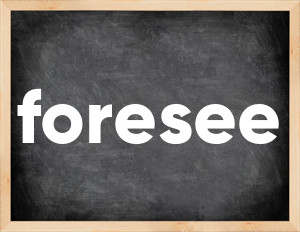 The English verb 'foresee' is pronounced as [fɔːˈsiː].
The English verb 'foresee' is pronounced as [fɔːˈsiː].
Related to:
irregular verbs.
3 forms of verb foresee: Infinitive (foresee), Past Simple - (foresaw), Past Participle - (foreseen).
Here are the past tense forms of the verb foresee
👉 Forms of verb foresee in future and past simple and past participle.
❓ What is the past tense of foresee.
Foresee: Past, Present, and Participle Forms
| Base Form | Past Simple | Past Participle |
|---|---|---|
| foresee [fɔːˈsiː] |
foresaw [fɔːˈsɔː] |
foreseen [fɔːˈsiːn] |
What are the 2nd and 3rd forms of the verb foresee?
🎓 What are the past simple, future simple, present perfect, past perfect, and future perfect forms of the base form (infinitive) 'foresee'?
Learn the three forms of the English verb 'foresee'
- the first form (V1) is 'foresee' used in present simple and future simple tenses.
- the second form (V2) is 'foresaw' used in past simple tense.
- the third form (V3) is 'foreseen' used in present perfect and past perfect tenses.
What are the past tense and past participle of foresee?
The past tense and past participle of foresee are: foresee in past simple is foresaw, and past participle is foreseen.
What is the past tense of foresee?
The past tense of the verb "foresee" is "foresaw", and the past participle is "foreseen".
Verb Tenses
Past simple — foresee in past simple foresaw
(V2).
Future simple — foresee in future simple is foresee (will + V1).
Present Perfect — foresee in present perfect tense is
foreseen
(have/has + V3).
Past Perfect — foresee in past perfect tense is
foreseen
(had + V3).
foresee regular or irregular verb?
👉 Is 'foresee' a regular or irregular verb? The verb 'foresee' is irregular verb.
Examples of Verb foresee in Sentences
- They couldn't foresee cell phones and the Internet and all this kind of stuff. (Past Simple)
- But the changes - they're never what we foresee. (Present Simple)
- You couldn't have foreseen this turn of events. (Present Perfect)
- Therefore, it is already possible to foresee the establishment of a genuine monopoly and dictatorial control over the implementation of the Commission's functions. (Present Simple)
- They could not foresee the changing of the climate and the failure of the rains. (Past Simple)
- As a result, it was difficult to foresee the outcome of an appeal. (Past Simple)
- It is difficult to foresee future developments in technology. (Present Simple)
- It's of the utmost importance that we can foresee everything. (Present Simple)
- They can foresee what's going to happen to them. (Present Simple)
- This misfortune could not have been foreseen. (Present Perfect)